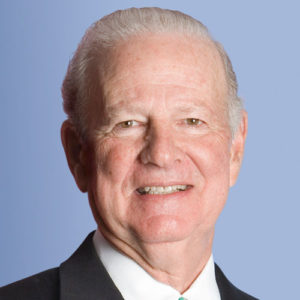In a short span of two decades, James A. Baker III led five presidential campaigns and served three presidents in such influential positions as secretary of state, secretary of the treasury, and White House chief of staff. In an interview for “Listening to Leaders,” a new George W. Bush Institute book, Baker explains the importance of leaders developing values early in their lives, knowing how to translate their values and vision into results, and developing trust with leaders from different cultures and backgrounds.
Below is an excerpt from his conversation with Bush Institute Editorial Director William McKenzie:
Question: How do you define great leadership?
Baker: I consistently go back to James MacGregor Burns, who defined it as “a commitment to values and the perseverance to fight for those values.” I agree, but would say it in a bit different terms: Leadership is knowing what to do and then doing it.
The tough part of leadership is the “doing it” part. A commitment to values is knowing what to do. The perseverance to fight for those values is doing it.
Q: Where do leaders get their vision and values?
Baker: You get your values in your upbringing and education. That’s one problem today. Too many people are not being exposed to and trained in the principles and values that have made this country great.
One of those is compromise, which is a dirty word today. Compromise is how the Founders arrived at agreements on things that were bitterly disputed. Sadly, we’ve lost that. The center is gone in politics.
If you don’t get (your values) from your upbringing, your education or your study of history, I don’t know how you’re going to get them.
Q: What have you learned about translating a vision into results?
Baker: You need to be decisive. You need to understand politics. After all, leaders are politicians in most countries today.
One of the most important things about implementing policy is understanding the constraints on the person across the table when you’re negotiating. It is very helpful to establish friendships, particularly friendships involving trust. Not that you sacrifice your country’s principles. But if you can establish a relationship of trust with the guy across the table, there’s a hell of a lot better chance that you will get something done.
Q: How hard was it as secretary of state to establish trusting relationships across cultures?
Baker: It wasn’t easy. In some cases, I couldn’t get it done. But I was able to develop a wonderful sense of trust with the Soviet foreign minister, Eduard Shevardnadze. I also developed mutual trust with Yitzhak Shamir, the hardline prime minister of Israel. We disagreed substantially on policy issues, but we trusted each other. He never leaked on me, I never leaked on him.
Let’s take a big issue like entitlement reform. We have talked about that forever, or at least since the Reagan administration, and Congress successfully dealt with Social Security reform in 1983.
The reason we were successful (in 1983) is because we understood you had to take it out of the political debate. You needed to have the leadership of both parties at the table under an agreement where both would agree that they wouldn’t use it politically against the other.
Q: That’s almost incomprehensible today.
Baker: Right, though it shouldn’t be.
Q: How hard was it to do that then?
Baker: It wasn’t easy. There was a lot of to-ing and fro-ing, but Reagan was committed to it, and we got (then-Democratic House Speaker) Tip O’Neill committed to it. We met secretly in the basement of my home in Washington.
You can’t do a big high-profile and sensitive thing like that in the public glare. You’re not going to get it done because there are too many opportunities for somebody to say something and everybody gets crossways. So we did it secretly.
Q: What is the difference being a leader in the international sphere and the domestic sphere? How different are those two?
Baker: Not a lot different. The same principles apply.
One of the first things that George H.W. Bush did when he became president was to take wars in Central America out of the domestic political debate. The wars in El Salvador and Nicaragua were a bitter divisive thing.
The first thing we did was to negotiate a bipartisan accord with Congress. My first measure of negotiation was not with a foreign power, it was with the Congress of the United States. Once we got it out of there, we were able to achieve peace both in El Salvador and Nicaragua.
Being a leader in those two spheres is not a lot different. It’s quite similar. You have to build different coalitions.
Reprinted by permission of Rowman and Littlefield from Listening to Leaders: Values, Empathy, Humility, and Relationships. Edited by William McKenzie (copyright 2019).

